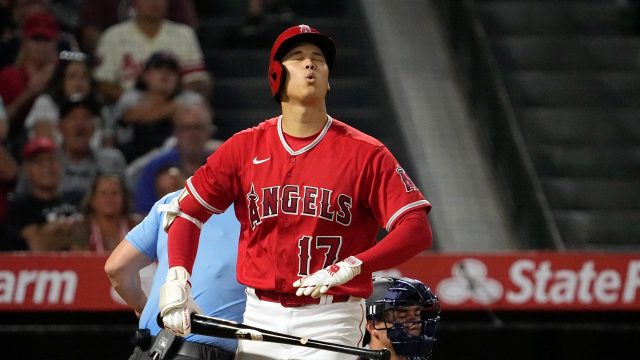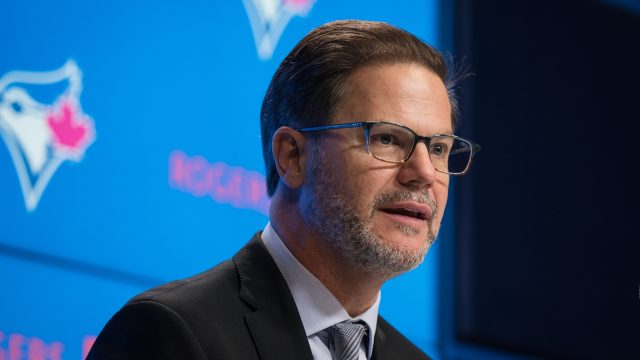
TORONTO — Discussion around the Toronto Blue Jays has centred around two things so far: offensive upgrades and Shohei Ohtani.
The former is a necessity with the team coming off a season where they ranked 14th in the majors in run scoring while Matt Chapman and Brandon Belt hit free agency. The latter is a game changer the likes of which the sport has arguably never seen, capable of radically altering the circumstances of whichever franchise lands him.
It’s understandable that these things are driving the Blue Jays discourse right now. That said, it’s also worth remembering that there’s work to be done on the pitching side of the equation for this team, despite the fact it’s bringing back most of the pitchers that combined for MLB’s fourth-best ERA last season (3.79).
That begins with the starting rotation where the quartet of Kevin Gausman, José Berríos, Chris Bassitt and Yusei Kikuchi look solid, but the depth behind them could use some work. To be clear, there isn’t a team in the majors with a fifth starter who has the ceiling of Alek Manoah — but it’s unclear what he’ll look like coming off a rough 2023.
Even if he’s fine, the guys behind him on the organizational depth chart such as Bowden Francis and Wes Parson would be tough to trust over a lengthy period of time if the team encountered injuries. While top prospect Ricky Tiedemann is rising, he’s coming off a season with a 62-inning workload and he’s only appeared at triple-A once.
“We’re not just going to ignore a portion of the market and not work on starting pitching,” general manager Ross Atkins told the Toronto chapter of the BBWAA on Tuesday. “We’re in a position now where it might be best to subtract, unless that acquisition was an optionable starter that hasn’t already clearly earned his strides to be a major-league starter.”
That statement is interesting in the context of the interest the Blue Jays showed in Aaron Nola earlier in the off-season, implying they might’ve moved one of their existing starters if they’d be able to lure him to Toronto.
Given the team’s current position, the idea of pursuing someone optionable makes sense. As long as Manoah remains in the organization, he should have a clear path to a rotation spot. Unless the Blue Jays made a major corresponding move trading a starter away, anyone the team brought in would need to be a player they could send to triple-A.
That’s a difficult type of player to acquire. Starters with options tend to be younger — or at least under team control for the long haul — and even rebuilding clubs often aren’t interested in moving on from them. The price of guys like that can be high on the trade market, and Toronto has to be judicious with what it gives up for someone who profiles as a sixth starter.
All of those circumstances make for a narrow band of teams the Blue Jays could call on and players who would fit the bill — but that doesn’t mean there aren’t a few possible fits. Daniel Lynch IV of the Kansas City Royals could make sense as a 27-year-old his rebuilding squad might not see too much upside in. Lynch has an ugly career ERA (5.18), but his peripherals have tended to be OK and his career fWAR (1.6) in 252 innings gives him a depth starter profile.
A more ambitious (and pricey) target would be Brandon Williamson of the Cincinnati Reds. Williamson was a highly touted prospect with the Seattle Mariners who was moved as part of the Eugenio Suárez-Jesse Winker trade. If Cincinnati plans to use newly acquired free agent Nick Martinez as a starter, Williamson is likely to be the odd man out in the team’s rotation — and the Reds might become open to moving him.
He’s probably overqualified as a sixth starter coming off a 1.8 fWAR season, but he could give Toronto a solid floor, if Manoah can’t find his groove again while serving as a strong candidate to fill a rotation spot cheaply in 2025 if Yusei Kikuchi departs in free agency.
On the relief side, the team could ride with what they have, but if the season started today, the Blue Jays might end up with both Trevor Richards and Mitch White in their pen as neither can be optioned in 2024. Considering Richards had a disastrous end to 2023 with a second-half ERA of 8.04 — and White allowed 10 runs in 12.2 MLB innings — that might not be an optimal strategy.
There are candidates elsewhere in the organization to play a role like that in Nate Pearson, Zach Pop and Hagen Danner, but there’s still room for improvement with Jordan Hicks hitting free agency.
Some kind of left-handed depth would be useful, for instance, considering Genésis Cabrera gave the St. Louis Cardinals 76.2 innings of sub-replacement-level work between the beginning of 2022 and the day they traded him to Toronto.
During that span, he posted the lowest fWAR (-0.9) among all relievers, with 70-plus innings pitched. He was great for the Blue Jays last season, but his range of outcomes is large.
Finding upgrades and depth additions for the Blue Jays pitching staff won’t be easy because they have so much already in place, and it’s not the team’s top priority this off-season. That doesn’t mean it isn’t important. If Toronto entered the season with precisely the group of arms they have today, it wouldn’t be a catastrophe but it would represent a missed opportunity to firm up the staff.
That almost certainly won’t happen, though — even if it means moving off a pitcher or two in house.
“If you’re adding, where is the subtraction, and the flexibility of having guys with options needs to be factored in,” Atkins said of his team’s predicament. “So, if you just work through our 13-man pitching staff right now and look who has options and who actually would be options, it starts to become a challenge, which is a very good starting point. That’s a challenge you want.”
In other words, the Blue Jays don’t have too many holes on the pitching side, but that doesn’t mean they shouldn’t — or won’t — be making any upgrades.






